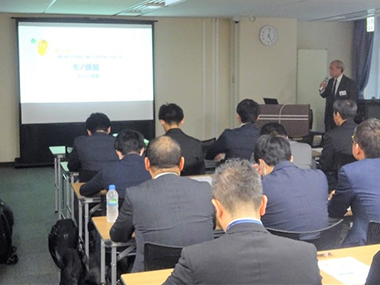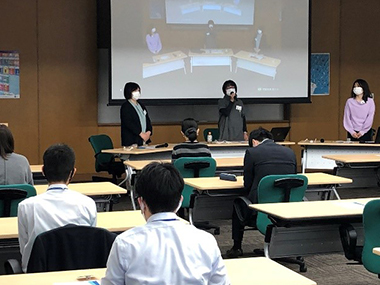Mizuho Leasing Group is promoting diversity and inclusion throughout our organization. We believe understanding and accepting diversity and differences of employees’ backgrounds are significant in terms of : helping each other to bring out their best, fostering solidarity, and thereby promoting their own growth while adapting to changes. By promoting the advancement of women, work-life balance, proactive communication, and flexible working styles, we are working to create a rewarding workplace environment where diverse ways of thinking and values are accepted and respected, and one that brings out the best in each employee's unique talents.
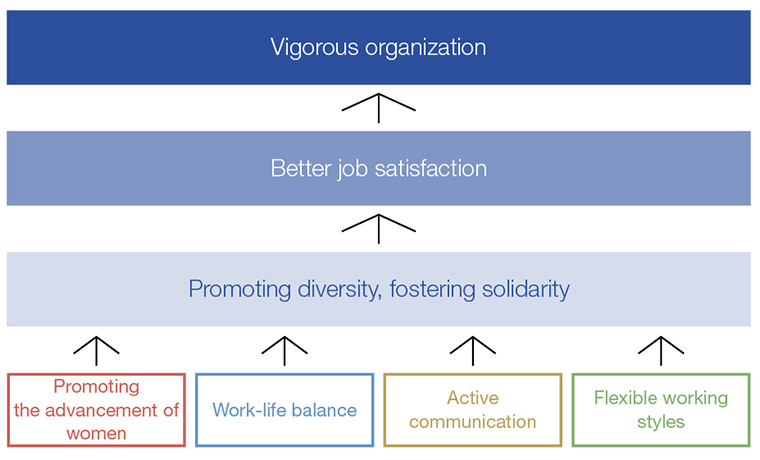
To promote understanding of diversity, we hold various seminars provided by external lecturers.
In addition, we are working to raise awareness among employees by distributing information through "Diversity Communication" via the in-house intranet to keep employees up to date on diversity-related initiatives, seminar schedules, and so on.
|
Paralympians' lecture
We have been developing the following action plan to improve the employment environment so that women can play an active role in the organization.
To create a company culture that provides a rewarding workplace, we have developed a comfortable working environment for employees by establishing systems that enable them to work flexibly according to the life-cycle.
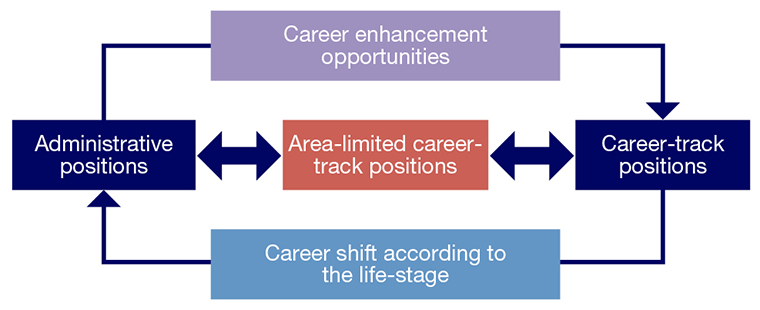
We provide training for female employees to develop their careers and take measures to promote their active participation and career advancement in the workplace.
|
Mizuho Leasing is striving to promote work-style reform and work-life balance through the following initiatives and systems.
In our drive to improve work-life balance and lift work productivity, we are promoting flexible working styles that are unbound by fixed locations or times. We have introduced five flexible staggered commuting patterns and a telework system for all employees. By establishing satellite offices as well as a work-from-home system, we endeavor to enable employees to work in the environment that best suits their individual situation.
As teleworking has normalized, we are looking for ways to raise work efficiency and stimulate communication. These include asking employees to fill out a questionnaire on telework to grasp the current situation and issues surrounding it, and communicating telework best practices to all employees. The tasks ahead include creating an even more comfortable working environment and promoting more flexible work styles.
To create a corporate culture where it is easy for male employees to take childcare leave, we are encouraging male employees to take childcare leave through activities such as interviewing each male employee with a newborn and distributing leaflets that give an overview of the work-life balance support system and a summary of how to take leave. In this way, Mizuho Leasing Group is supporting male employees' participation in childcare.
Aiming to help them strengthen awareness of participation while achieving a balance between work and childcare, learn about the approach to work after returning to work, and have knowledge about housework and childcare, we offer Childcare Leave Returnee Training for employees who have returned to work after childcare leave and host round-table talks as a venue for working mothers to exchange information. We are also making efforts to ease or resolve anxieties and worries that employees may have by inviting experienced lecturers to both the training and round-table talks, from whom participants can receive advice.
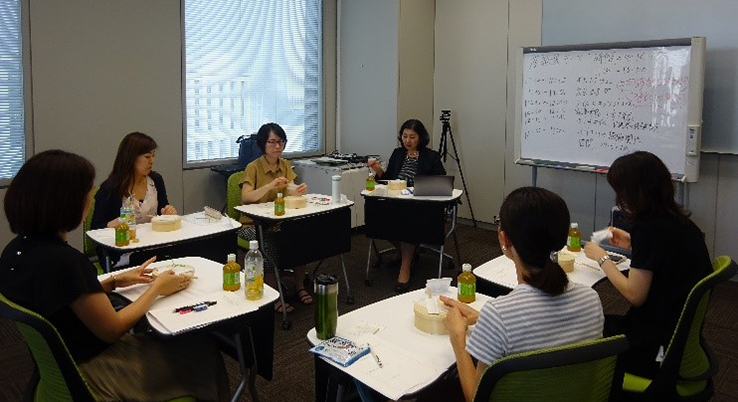
We hold "Dementia Seminars" and "Nursing Care Round-table Talks" for Group employees by inviting external lecturers, covering basic knowledge on nursing care and the nursing care insurance system, as well as on how to prepare themselves for nursing care and to share concerns. In addition, we have set up a free consultation desk with instructors and have established a system to respond to concerns and consultations related to nursing care.
Furthermore, by launching an e-learning course about "Support for Work and Nursing Care Balance," covering necessary points for balancing work and nursing care, we offer an opportunity to deepen the understanding of employees who carry the burden of caregiving.
Through these seminars and lectures, we aim to have the entire workplace better understand nursing care so as to create a workplace culture of mutual support.
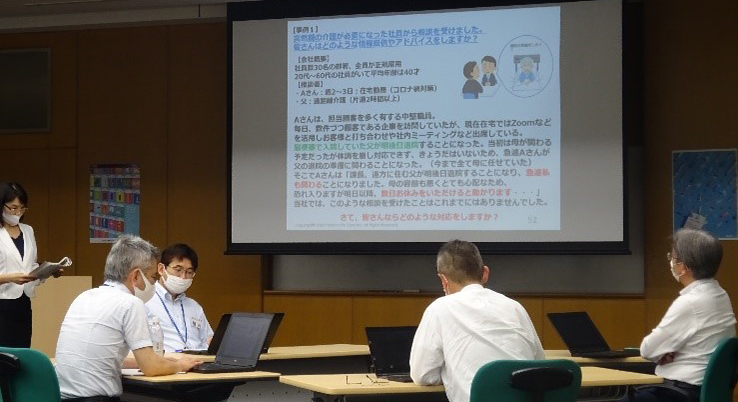
We have created a handbook that gives a basic explanation of nursing care, how to balance work and nursing care, and the initial action to take when facing nursing care in a way that is easy to understand, and distributed it to employees.
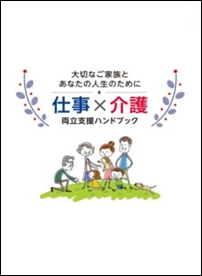
|
Mizuho Leasing is actively working to support the development of children who will bear the next generation, and received the Platinum Kurumin certification from the Minister of Health, Labour and Welfare on December 16, 2020 based on the Act on Advancement of Measures to Support Raising Next-Generation Children as a company that is striving to deliver a higher level of child development support.
We will continue to proactively support all employees in balancing work and childcare, and in this way strive to create a vibrant company culture where employees feel satisfied with their job.
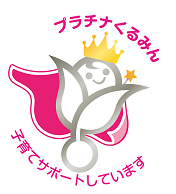
Mizuho Leasing Group established Torakoya*, an in-house educational institution, in October 2017 with the purpose of transferring knowledge and know-how accumulated by the Group throughout its history and providing a venue for communication among employees across generations. At Torakoya, instead of classroom lectures, senior employees with a wealth of experience give participatory lectures, thereby stimulating communication across workplaces, careers, and generations.
(* Torakoya was named by blending Toranomon, the location of our head office, and terakoya, a type of private elementary school present during the Edo period, following a vote by employees.)
We run Torakoya under a variety of themes. In fiscal 2020, with the theme of "Working While Caring for a Child," three female employees talked about work styles and shared their know-how on balancing work and childcare based on their experience. In fiscal 2021, participants of "Round-table Talk by Fathers Actively Participating in Childcare" learned about male employees' childcare leave from the experience of three male employees who took childcare leave. In addition, a life insurance company employee temporarily transferred to Mizuho Leasing Group gave a lecture entitled "Direction of Collaboration between a Life Insurer and a Leasing Company."
Mizuho Leasing considers developing a workplace environment where employees can work healthily and safely will lead to revitalizing the organization through improved employee vitality and enhanced productivity.
Under this idea, we hold a Health Committee meeting based on the Industrial Safety and Health Act once a month to maintain and promote the safety and health of employees, while working to improve our workplace environment, maintain and improve employees' health.
We provide an annual medical checkup for all employees. For expatriate employees and their family members living together, we provide the necessary vaccinations for each country they are stationed in and a medical check-up once or twice a year in that country or Japan, depending on the country's sanitary conditions or medical level.
In addition, according to the basic policy of promoting mental health—since relaxing, gaining spiritual enrichment and securing a comfortable, safe, and worker-friendly environment are important for employees' mental health—we conduct a stress check once a year.
To ensure work-life balance and provide employees with enough time for spiritual enrichment, we have been running a campaign since fiscal 2017 to encourage employees to take paid leave, with the goal of achieving an average paid leave utilization rate of 70% for all employees. We established an anniversary holiday (special vacation) system in October 2019 by further advancing our endeavors to create time for our employees to pursue their passions.
Moreover, we set Wednesdays as "no overtime days" and assigned two additional no-overtime days each month, July and August, for each division or branch.
Mizuho Leasing hires people with disabilities, deciding on assignments and responsibilities once they join the company by considering the details of the disability in question and the type of work each applicant would like to do. We will continue to hire people with disabilities in view of the social significance of creating opportunities for them.
